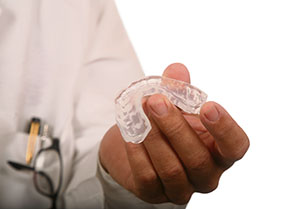by Airman 1st Class Alexander Turner
86th Dental Squadron dental assistant

Mouthguards should be worn during sports to prevent dental injuries.
The first rule when it comes to sports is safety. An athlete is 60 percent more likely to receive an injury by not wearing the appropriate safety gear. Dental injuries are the most common type of orofacial injury sustained during participation in sports and most are preventable.
The American Dental Association estimates 2 million teeth are knocked out every year while mouthguards help prevent more than 200,000 injuries annually.
A mouthguard is a soft, plastic, oral appliance that when worn protects the teeth, mouth, cheeks, tongue and jaw during sporting activities. It should be worn when participating in football, wrestling and basketball and also for sports like skateboarding and martial arts — any sport in which there could be a potential injury to the mouth. Mouthguards are recommended for both male and female athletes as well as children. For athletes under orthodontic care, it’s extremely important to wear a mouthguard to prevent cuts in the soft tissues.
There are several types of mouthguards that are available for use. Thermoplastic (“boil and bite”) mouthguards are made of a material that can be softened in hot water and form fitted to the teeth at home.
These mouthguards are inexpensive and effective but can be bulky
and sometimes fit loosely. The best option for most serious athletes is a custom-fitted mouthguard made by a dentist. This involves taking dental impressions and the laboratory fabrication of the mouthguard on stone models of the athlete’s teeth.
Custom-fitted mouthguards are the best all-around option for comfort, fit and protection.
Caring for your mouthguard
Clean your mouthguard with cool, soapy water and store it in a well-ventilated container allowing it to dry. Keep your mouthguard away from heat. Heat may cause it to distort and adversely affect the fit.
If you play sports, a mouthguard may be an important safety consideration to maintain a healthy smile. Ask your dentist at your next visit about mouthguards and what options are the best for you.
For more information, call the 86th Dental Squadron at 479-2210.


